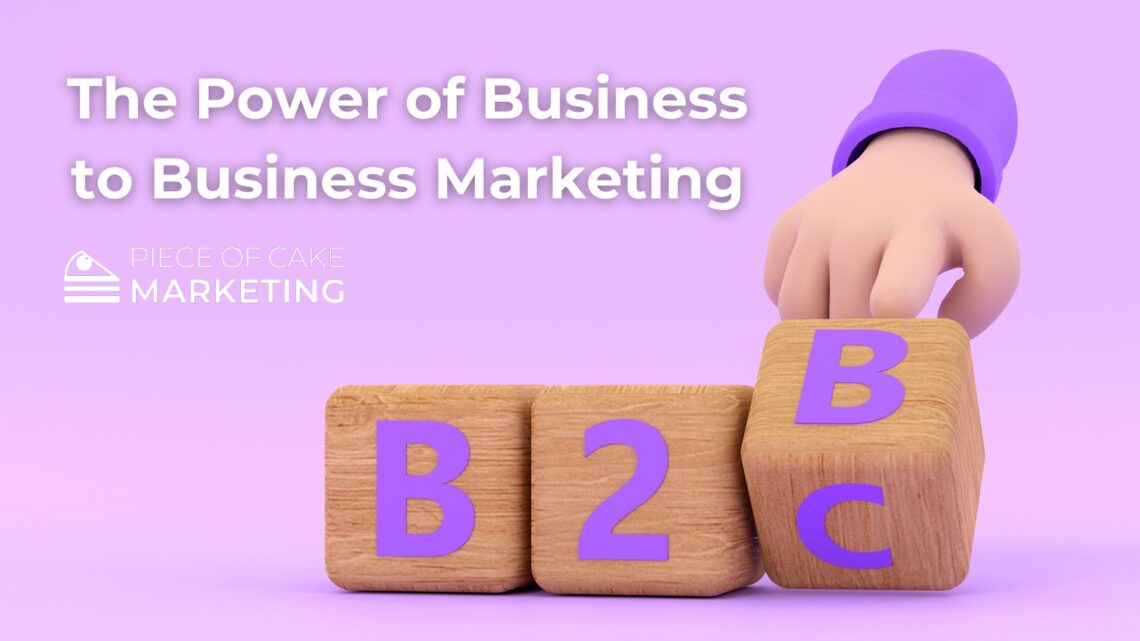Business to Business (B2B) marketing is a dynamic and essential facet of the corporate world, focusing on enterprises selling products or services to other businesses. Unlike Business to Consumer (B2C) marketing, B2B marketing operates within a complex ecosystem that demands targeted strategies, relationship building, and tailored solutions. Let’s take a look into the world of B2B marketing, share insightful UK-based case studies, and explore how social media, particularly LinkedIn, can be a game-changer in your B2B marketing endeavours.

What is Business to Business (B2B) Marketing?
B2B marketing encompasses activities and strategies employed by businesses to promote their products or services to other businesses. It’s about understanding the unique needs, pain points, and goals of fellow enterprises and crafting tailored marketing efforts to meet those requirements.
Business to Business Marketing on Social Media
In the realm of B2B marketing, using the power of social media can be a game-changer. It offers a unique opportunity to connect, engage, and foster relationships with other businesses, professionals, and industry thought leaders.
1. LinkedIn – The B2B Powerhouse
LinkedIn stands out as the ultimate platform for B2B marketing. Its professional networking nature makes it a goldmine for businesses seeking to connect with like-minded professionals, industry peers, and potential clients. Here’s how to make the most of LinkedIn:
Networking – Build your connections by connecting with other businesses and professionals in your industry. This opens doors to valuable partnerships and collaborations.
Insightful Content – Share thought-provoking articles, case studies, and industry reports to establish your authority and expertise. Remember to add an insight into you and why you do what you do.
Participate in Groups – Join relevant LinkedIn groups or start your own to engage in industry-specific discussions and showcase your knowledge.
Meaningful Conversations – Engage with your connections through meaningful conversations, addressing industry pain points and challenges.
If you’re wondering whether you should use a LinkedIn profile or LinkedIn Page we have a blog on that too!
2. Twitter/X – Real-Time Engagement
Twitter’s fast-paced environment is ideal for real-time engagement, making it a valuable platform for B2B marketers. Here’s how to leverage Twitter effectively:
Timely Updates – Share industry news, updates, and insights as they happen to position your business as an industry leader.
Customer Service – Use Twitter to provide exceptional customer service, addressing enquiries and concerns promptly.
Hashtags – Employ relevant hashtags to increase the discoverability of your content and join trending conversations in your industry.
Engage with Influencers – Connect with industry influencers and thought leaders to expand your reach and credibility.
Twitter’s brevity and immediacy make it a valuable tool for staying connected with your B2B audience. Since moving to X things appear to have changed. Lack of insights make it challenging. We will wait to see what the future of X holds.
3. Facebook – B2B Branding and Community Building
While Facebook is often associated with B2C marketing, it can also play a significant role in B2B branding and community building. Here’s how:
Company Page – Create a professional Company Page to showcase your business, share updates, and provide a central hub for your Facebook presence.
Content Sharing – Share informative blog posts, videos, and industry news to educate and engage your audience.
Groups – Join or create industry-specific Facebook Groups to facilitate discussions, exchange ideas, and connect with peers.
Paid Advertising – Utilise Facebook Ads to reach a broader B2B audience and drive targeted traffic to your website.
Facebook’s vast user base and advertising options can complement your B2B marketing efforts.
4. YouTube – Visual Storytelling
YouTube’s video-centric platform offers opportunities for visual storytelling and educational content. Here’s how to use YouTube effectively in B2B marketing:
Educational Videos – Create informative videos that address industry challenges, provide solutions, and showcase your expertise.
Product Demos – Demonstrate your products or services in action to help potential clients understand their value.
Thought Leadership – Share interviews, webinars, and presentations to establish thought leadership in your niche.
Engagement – Encourage viewers to like, comment, and subscribe to foster engagement and build a loyal audience.
YouTube’s visual appeal and wide reach can help you convey complex B2B messages effectively.
5. Instagram – Visual Branding
Instagram’s visual nature makes it an excellent platform for visual branding and storytelling, even in the B2B space. Here’s how:
Visual Storytelling – Share behind-the-scenes glimpses, employee spotlights, and company culture to humanise your brand.
Product Highlights – Showcase your products or services in an aesthetically pleasing manner, focusing on their unique features.
User-Generated Content – Encourage clients to share their experiences with your products or services and feature their content.
Instagram Stories – Utilise Stories to provide real-time updates, share quick tips, and engage with your audience.
Instagram’s emphasis on aesthetics and creativity can help your B2B brand stand out in a visually competitive landscape.
Multitude of Opportunities to Connect, Engage, and Thrive
B2B marketing on social media offers a multitude of opportunities to connect, engage, and thrive in. By understanding the unique strengths and features of each platform, businesses can tailor their strategies to reach their B2B audience effectively. Whether it’s LinkedIn for professional networking, Twitter for real-time engagement, or YouTube for visual storytelling, the right social media channels can elevate your B2B marketing efforts to new heights.
Business to Business Offline Marketing
Offline marketing opportunities often take a back seat to their online counterparts. However, B2B businesses should not underestimate the power of offline marketing strategies. These tactics can provide a more personal touch and foster meaningful connections with potential clients. Let’s explore various offline marketing opportunities that can complement your online efforts.
1. Networking Events and Trade Shows
Networking events and trade shows offer valuable face-to-face interactions with potential clients and industry peers. Here’s how to make the most of these opportunities:
Booth Exhibitions – Set up a booth to showcase your products or services and engage in direct conversations with attendees.
Seminars and Workshops – Host informative sessions or workshops to demonstrate your expertise and offer value to your audience.
Networking – Attend networking sessions to connect with potential clients, partners, and industry influencers.
Branded Materials – Create branded promotional materials such as brochures, business cards, and freebies to leave a lasting impression.
2. Direct Mail Campaigns
Direct mail campaigns can be highly targeted and personalised, making them effective for B2B marketing. Here’s how to use direct mail to your advantage:
Personalisation – Craft personalised messages and offers tailored to the recipient’s needs and pain points.
High-Quality Collateral – Invest in professionally designed and printed materials, such as postcards or catalogues, to convey professionalism.
Follow-Up – Include a clear call to action and provide multiple ways for recipients to contact you.
Measurement – Implement tracking mechanisms to measure the campaign’s effectiveness and adjust your strategy accordingly.
3. Industry Conferences and Summits
Participating in industry-specific conferences and summits can position your business as an industry leader. Here’s how to maximise your presence at such events:
Speaking Opportunities – Secure speaking slots to share your insights, expertise, and thought leadership with a captive audience.
Panel Discussions – Participate in panel discussions to engage in industry conversations and showcase your expertise.
Sponsorship – Consider sponsoring specific sessions or areas to increase your visibility.
Networking – Connect with peers and potential clients during breaks and social events.
4. Sponsorships and Partnerships
Sponsoring events or partnering with industry associations can enhance your brand’s credibility and visibility. Consider the following:
Event Sponsorship – Sponsor relevant industry events, conferences, or local business gatherings to get your brand in front of the right audience.
Association Partnerships – Collaborate with industry associations or organisations to access their member networks.
Content Collaboration – Partner with complementary businesses for joint content creation, such as webinars or whitepapers.
5. Print Advertising
While online advertising dominates, print advertising still holds relevance in B2B marketing. Explore the following print options:
Trade Magazines – Advertise in industry-specific magazines and journals to reach a targeted audience.
Local Newspapers – If your business operates locally, consider advertising in regional newspapers.
Directories – Ensure your business is listed in relevant directories, both online and in print.
Don’t Overlook Offline Marketing Opportunities
B2B offline marketing opportunities, these strategies provide a personal touch, foster connections, and can significantly complement your online efforts. Whether you’re participating in trade shows, leveraging direct mail campaigns, or attending industry conferences, these offline tactics can help your business connect with potential clients in a meaningful way. By combining online and offline marketing strategies, you can create a well-rounded approach to reach your target B2B audience effectively.
Business to Business Marketing Case Studies

There are lots of great business promoting their businesses in the UK, here are a few that we have picked out.
Sage: Empowering Small Businesses
Sage, a UK-based software company, has successfully leveraged B2B marketing to empower small businesses with their accounting and business management solutions. Through targeted content marketing, webinars, and partnerships with industry influencers, Sage has not only boosted its brand awareness but has also provided valuable resources for businesses, establishing themselves as trusted advisors in the B2B sector.
IBM: Nurturing Enterprise Relationships
IBM, a global technology giant with a strong UK presence, excels in B2B marketing by focusing on relationship building. They engage in thought leadership through whitepapers, industry events, and webinars, showcasing their expertise in areas like AI, cloud computing, and cybersecurity. By nurturing relationships and providing solutions tailored to business needs, IBM continues to thrive in the B2B landscape.
Mailchimp: Simplifying Marketing for SMEs
Mailchimp, known for its user-friendly email marketing platform, caters to UK SMEs through a targeted B2B approach. Their case study exemplifies the power of providing educational content, email marketing workshops, and user-friendly tools to empower small businesses in their marketing efforts.Top of Form
B2B marketing is a multifaceted discipline that requires a deep understanding of the business landscape, targeted strategies, and relationship building. Leveraging social media, particularly LinkedIn, can be a game-changer in connecting with businesses and professionals, establishing authority, and driving growth in the B2B arena. As you embark on your B2B marketing journey, remember that it’s about fostering lasting relationships and delivering tailored solutions that help businesses thrive.
Why Choose Piece of Cake Marketing for Your B2B Marketing Strategy?
Are you ready to elevate your B2B marketing game? Consider booking a strategy session with Piece of Cake Marketing to set your business on the path to future success.
We believe in sweetening the deal! Our in-person sessions even include a complimentary slice of cake to keep you fuelled and inspired during our productive partnership.
For just £499, you’ll receive our full attention, clarity on your market positioning, actionable recommendations, and a roadmap for sustainable growth. Plus, you’ll walk away with fresh insights and renewed inspiration to propel your B2B marketing efforts forward.
Don’t let the opportunity pass you by. Reach out to us at hello@pieceofcakemarketing.co.uk today to schedule your strategy session. Your business’s future is far too important to leave to chance. With Piece of Cake Marketing as your trusted partner, you’ll be on a well-guided path to enduring success.
